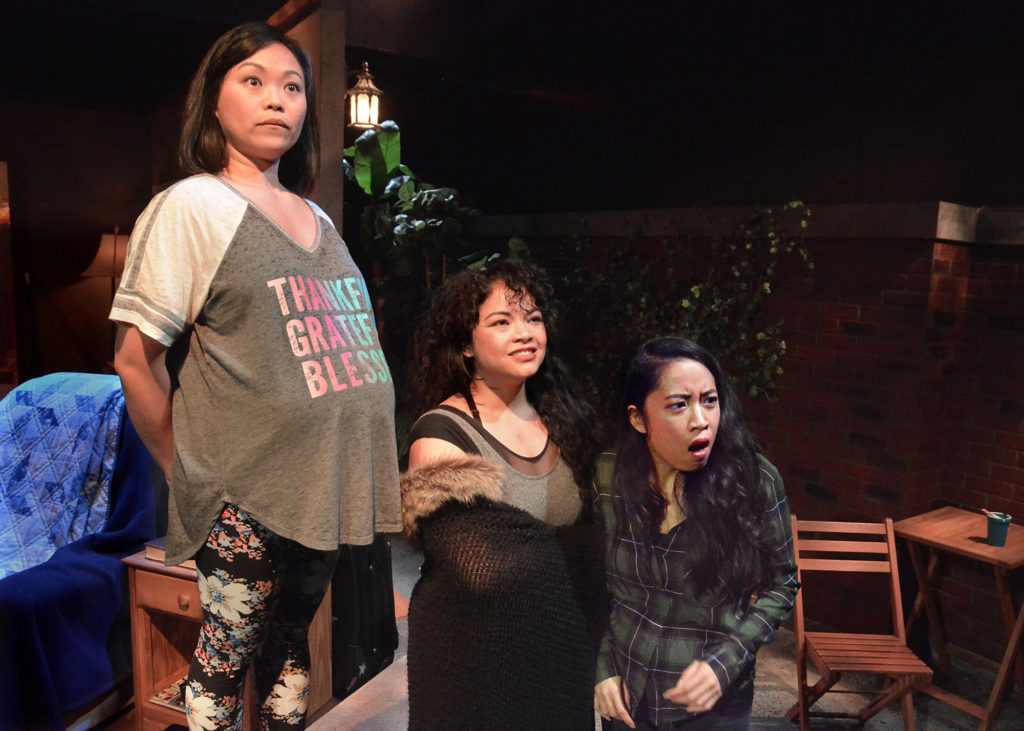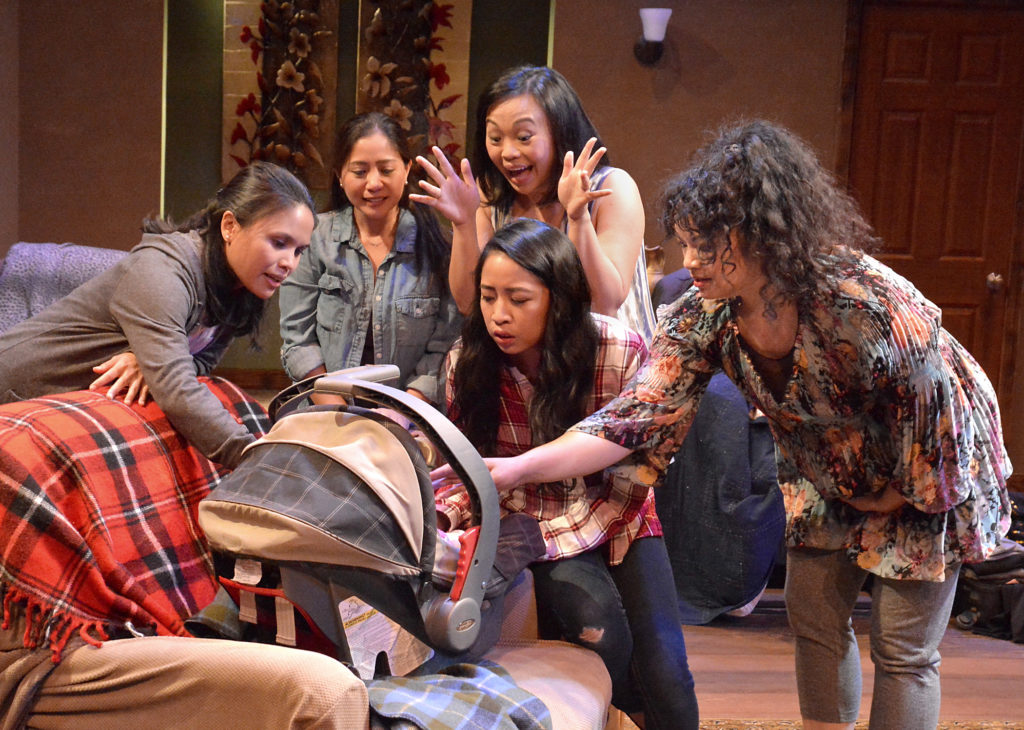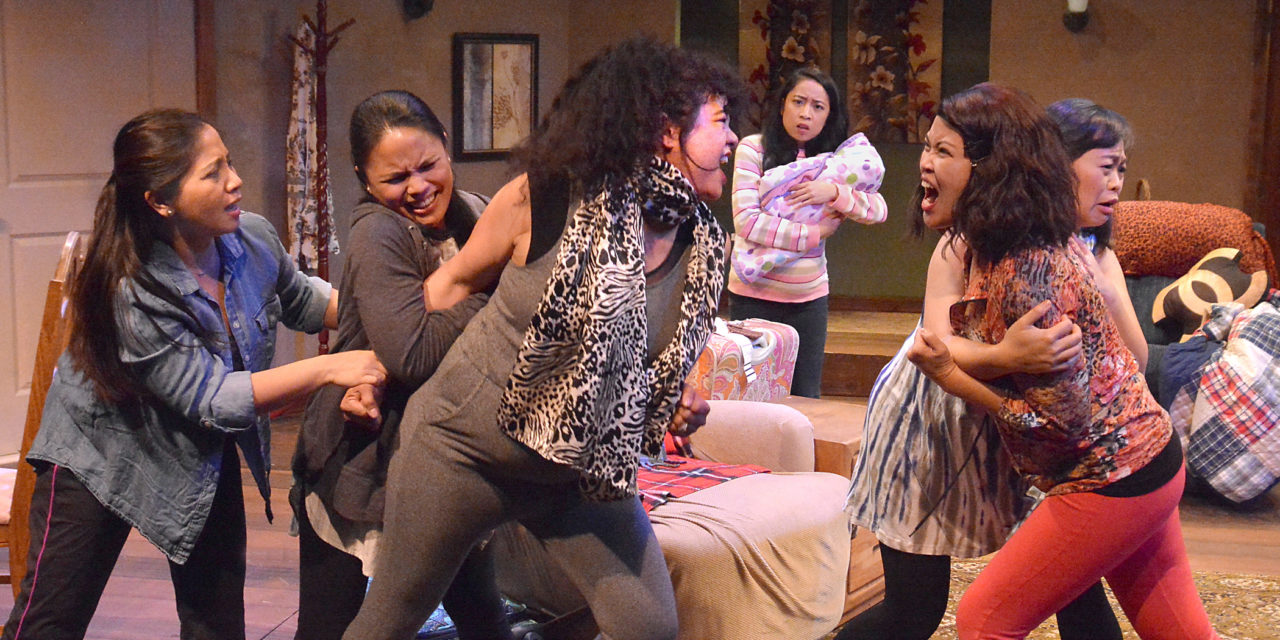Situated in the heart of Los Angeles’ Los Feliz neighborhood, The Skylight Theatre Company delivers a real treat in the World Premiere of Boni B. Alvarez’s play America Adjacent. Directed by Jon Lawrence Rivera, the play features seven Filipino-American actresses portraying six pregnant women and one woman known only has “Administrator” who oversees their confinement in a one-bedroom, one-bath unit in East Hollywood. These women are here to give birth and to ensure their children receive an American passport. They may have been promised sight-seeing adventures and trips to the beach before they [or their families] paid what sounds like a small fortune to send them to America but once they arrive they find they are not allowed to leave the apartment for fear of deportation or jail.
If this sounds stark, that’s only because a simple paragraph of explanation cannot possibly do the script justice. Los Angeles based playwright Boni B. Alvarez is himself a son of Filipino immigrant parents and he has tapped into his roots to craft multi-dimensional characters that deliver surprising levels of humor in spite of the fact that they are essentially prisoners. The humor reveals the humanity and depth of these characters in ways that draw you close to them no matter how far removed you might feel from their situation.

Sandy Velasco, Toni Katano, and Arianne Villareal
For example, Aimee Reyes (played by the deliciously funny Sandy Velasco) is the woman most likely to encourage the others to pray, sing Christian songs and hold the Bible closest to her heart, however, she’s also the one that more than delights at the sight of [off-stage] neighbors having sex in a jacuzzi. She’s so turned on by it, it launches her into a speech about how much she misses sex with her husband with a visceral physicality to match. One hopes that no one reading this review might have had the experience of being kept inside an apartment against their will for over 9 months but one might equally hope that all are able to relate to Aimee’s desire. It’s that kind of shading in the writing that makes all of these women feel quite real.
Roshelyn Sandoval [played by Angela T. Baesa] acts as the den mother in a way. She has given birth to her baby and we gather over time that she is waiting for the moment when she will be allowed to return to the Philippines. We gather also that she is likely to be the most educated member of the group and the one with the most to lose if the house is discovered and they are all sent home without the papers they so long to acquire. Her main nemesis in the house is Janelle May Cabusao [Evie Abat], a woman who has not fallen in love with her son the same way Roshelyn has with her child and we learn over time that there might be good reasons for this.
Janelle is a fascinating character. She breaks the rules, slipping out of the house repeatedly to meet Raul, a Mexican owner of a taco truck that we never see or hear from. She doesn’t express outward affection for her son but neither is she willing to sit quietly when he is put in danger. We learn enough about her to know she was a mistress to a wealthy man who seems poised to take the baby [the Administrator even puts the father’s name on the birth certificate]. When country girl Sampaguita Bautista [Samantha Valdellon] arrives at the house, Janelle makes it her mission to show this naive girl that there is more outside their apartment than she might have ever dreamed of. This infuriates Roshelyn, amuses fellow housemate Paz Locsin [Toni Katano] and seems to upset young Divina Ayala [Arianne Villareal] even though Divina seems to only be able to ever confide in Sampaguita.
Divina has a secret, and it’s not a pretty one. In the hands of lesser actors or a lesser playwright, the late reveal regarding the father of her child [not going to reveal that here in the hopes all of you will have a chance to see the play for yourself] could have come across as nothing more than a ham-handed dramatic twist but here this truth illuminates Divina’s desperate need to deliver a healthy baby and the lengths she might go to in order to ensure that. She’s quiet most of the play but something tangible in Sampaguita’s character draws the girl’s confidence and thankfully Sampaguita doesn’t oversimplify things by betraying that confidence [at least not easily]. Roshelyn, Divina, and Janelle each suffer in silences that are quite moving to observe if you’re paying attention. It isn’t a large space and there’s enough mismatched furniture to elicit a claustrophobic air, which ultimately makes each emotional outburst feel justified.
While Sandy offers unwitting beats of humor when her summons to prayer might clash with her free acceptance of her sexual nature, Paz’s complaints about the size of her stomach, messy pile of clothing around her chair, Chanel pillow and demands that everyone pay attention to her on her birthday [a beautiful moment from Ms. Katano] often act as well-timed if not barbed moments of comic relief. No matter how angry they might get, no matter how tempted they are to rip each other’s hair out, none of these women are able to maintain their particular attitudes when the sound of police helicopters draw near, followed by sirens. No matter who was fighting whom, no matter what little victory was at stake when the police draw near they all lunge to douse the lights and hide behind the furniture. A fist pounding at the door sent this reviewer’s pulse racing, fearful of the outcome.

Arianne Villareal, Hazel Lozano, Angela T. Baesa, Toni Katano, Samantha Valdellon, Evie Abat, Sandy Velasco in Skylight Theatre’s production of American Adjacent
It’s difficult to use the word thankfully, but nothing as sinister as ICE comes for them. Instead, and repeatedly, Administrator [Hazel Lozano] is the one demanding entrant and the one most eager to leave once she’s arrived. Administrator is a visual reminder of all that America might promise; a cell phone in hand that has been extracted from a fancier purse than any of the women in the house might own, she wears stylish, well-fitting clothing, tweaks her hair into a perfect swoop as she reminds them over and over what is at stake for them [“you don’t want to end up like the Chinese,” she says referring to a house full of Chinese women also hoping to give birth to American children that was raided]. Playwright Alvarez notes in the playbill that a real-life raid of a birthing house filled with Chinese mothers in the San Gabriel Valley inspired him to explore the central question of what one might be willing to give up to give their child a better life is apparent in every scene.
From the few minutes before the house lights dim when actors take the stage and become their characters with solid, very specific work that tells us volumes, we sense these are real people with something to show us. The writing is effective enough to present some very powerful themes without hammering us over the head with them. There’s no intermission, which is often a very smart choice and here, a vital one. We never get to escape the space and that helps us sense what it would feel like to be stuck in this house without even the hope of a walk around the block. If one could argue about any choice that is made it would be the one to allow Sampaguita to give her speeches with a soft focus on that theatrical, imagined horizon that we see so often in plays where characters are given a series of emotional hurdles to overcome without engaging with another character. In this situation, at least two of Sampaguita’s speeches unfold in front of her five roommates and though, yes, we are able to all see her face so beautifully as she turns out to face the house and speak, it is difficult not to wonder what might have happened if she were asked to engage with her fellow actors instead.

Samantha Valdellon, Angela T. Baesa, Sandy Velasco, Arianne Villareal, Toni Katano
That said, she has a couple of just gorgeous lines to deliver that hit you directly in the heart. Sampaguita talks of home and states “If our islands drowned in the ocean tonight the world would not be affected as if nothing happened. This is not true for America, I think” [apologies to Mr. Alvarez if I got the words wrong–scribbling in the dark can lead to confusion]. As the play comes to a close, Sampaguita comes to a point where we can see she has grown up a little bit and is now better capable of facing a future she seemed to only fear at the start. When she first arrived at the house she talked about the billboards she saw along the road featuring actors and the words “For Your Consideration.” Everyone in the audience chuckled–we all knew what she was referring to and though one might wonder how anyone in the world would be able to claim they didn’t understand what those billboards were for in the year 2019, that also goes to show how small-minded us big city folk have become. By the end of the play as Sampaguita sits alone in the small garden outside their apartment she is able to speak to her unborn child and wonder what the future holds in store; it could be anything, even a US Presidency because “you qualify.” Already proud and yet also already aware of the sadness it might bring, she tells her child “You are an American, everything is for your consideration.”
Everything is. And yet everything isn’t. And this play has the power to reveal that truth to us. Thank you, Skylight Theatre and Boni B. Alvarez.
America Adjacent performs at the Skylight Theatre [1816 ½ North Vermont, Los Angeles, CA 90027] at 8:30 pm Fridays and Saturdays, 3:00 pm Sundays through March 24, 2019 (Added performances at 8:00 pm on Mondays, March 4, 11, & 18)
The creative team includes Gary Grossman and Tony Abatemarco (Producer), Giselle Töngi Walters (Associate Producer), Christopher Scott Murrillo (Scenic Design), Matt Richter (Lighting Design), Austin Quan (Sound Design), and Mylette Nora (Costume Design).
Information and reservations: (213) 761-7061 or (866) 811-4111. Online ticketing: http://SkylightTix.org
Website: http://skylighttheatre.org
This post was written by the author in their personal capacity.The opinions expressed in this article are the author’s own and do not reflect the view of The Theatre Times, their staff or collaborators.
This post was written by Christine Deitner.
The views expressed here belong to the author and do not necessarily reflect our views and opinions.


















